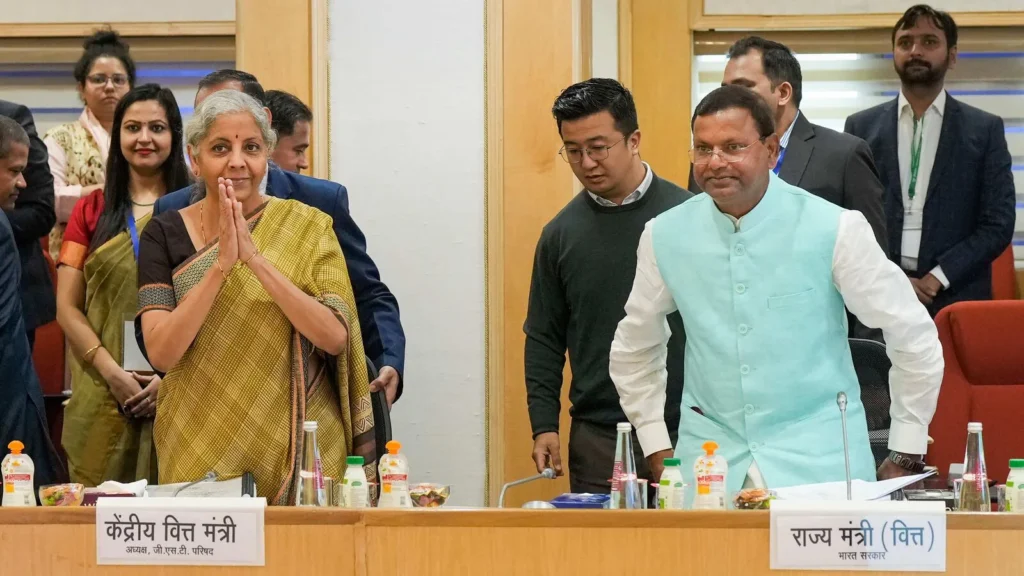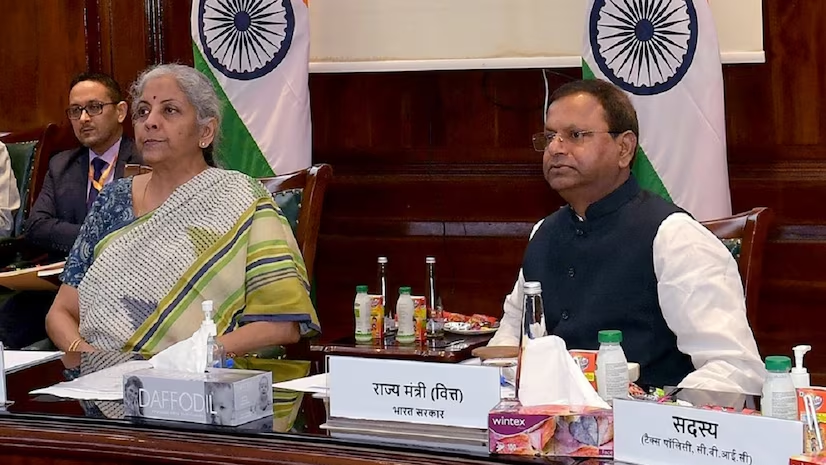The GST Council has established a group of ministers to assess the future of the GST compensation cess applied to automobiles, aerated drinks, and tobacco. Additionally, the council approved a rate reduction on cancer drugs such as Trastuzumab Deruxtecan, Osimertinib, and Durvalumab. However, no progress has been made regarding online gaming.

GST Council Provides Tax Relief to Foreign Airlines, Helicopter Services, and Research Institutions; Reduces Rates on Cancer Drugs and Snacks
The Goods and Services Tax (GST) Council convened on Monday to introduce a series of reforms aimed at providing relief across several sectors. In its recent meeting, the Council extended tax benefits to foreign airlines, certain helicopter services, and research institutions, while also cutting taxes on vital cancer drugs and specific snack items. Additionally, a group of ministers was assigned to review demands for tax relief on insurance premiums. Here’s a comprehensive breakdown of the key decisions made during the meeting.
Relief for Foreign Airlines and Aviation Sector
In a significant move, the GST Council decided to offer tax exemptions for foreign airlines operating in India. According to the decision, foreign airlines will no longer be subjected to GST on services imported from their overseas arms when these services are availed without consideration or payment. This measure brings relief to foreign airlines who were previously hit with substantial tax notices for similar services. Revenue Secretary Sanjay Malhotra confirmed that this relief applies retroactively, allowing businesses that have yet to pay the tax to be condoned. However, those that have already made payments will not be entitled to refunds.
This resolution effectively puts an end to the recent series of show-cause notices issued by the Directorate General of GST Intelligence (DGGI), where foreign airlines were faced with a tax demand amounting to ₹39,000 crore for services availed through their branch offices in India. Legal experts have lauded this decision, stating that it provides much-needed clarity and relief for the aviation sector.
Reduction in GST for Helicopter Services
Another key decision made during the meeting was the introduction of a 5% GST on passenger transport services provided by helicopters on a seat-sharing basis. This rate reduction aims to make helicopter services more affordable and accessible to the general public. Additionally, the Council decided to regularize GST for the past period on an ‘as is where is’ basis. While seat-sharing services have seen a reduction in taxes, the chartering of helicopters will continue to attract an 18% GST rate.
Tax Cut on Essential Cancer Drugs
One of the most notable developments from the meeting was the Council’s decision to reduce the GST rates on critical cancer drugs. The tax rate on drugs like Trastuzumab Deruxtecan, Osimertinib, and Durvalumab has been slashed from 12% to 5%. This move is expected to ease the financial burden on cancer patients and make life-saving treatments more affordable. Healthcare experts have welcomed this decision, as it reflects the government’s commitment to improving access to essential medical treatments.

Reduction in GST on Snacks and Increase for Car Seats
In a bid to provide relief to the food and beverage industry, the GST Council also reduced the tax rate on certain snack items. Ready-to-eat extruded or expanded products will now attract a lower GST rate of 12%, down from the previous 18%. This reduction is likely to benefit both manufacturers and consumers by making these products more affordable.
However, the Council also made the decision to increase the GST rate on car seats. The tax on car seats has been raised from 18% to 28%, signaling the government’s intent to generate additional revenue from the automobile sector. Industry experts are analyzing the potential impact of this rate hike on car manufacturers and consumers alike.
Ministerial Panel to Examine GST Compensation Cess
As part of its ongoing efforts to streamline taxation, the GST Council has tasked a group of ministers with examining the future of the GST compensation cess levied on automobiles, aerated drinks, and tobacco. The compensation cess, initially introduced to support states during the pandemic, cannot be collected once the Centre fully pays off the market loans taken for liquidity support or beyond March 2026, whichever comes first. However, given the revenue needs of both the Centre and states, there is speculation that this levy may continue in another form.
Union Finance Minister Nirmala Sitharaman, who chaired the meeting, explained that the ministerial group will study these issues in detail and present its findings at a future Council meeting. The group is led by Bihar Deputy Chief Minister Samrat Chaudhary, who will be tasked with reviewing the demands for a reduction in GST rates on health insurance premiums as well. The group is expected to submit its report in October, with the Council set to consider its recommendations in the November meeting.
Research Institutions Receive Tax Exemption
In a move aimed at boosting research and development in India, the GST Council decided to exempt certain research and development services from GST. These exemptions apply to services provided by notified government entities, universities, research associations, colleges, or other institutions, whether funded by government or private grants. Tax notices that were previously issued to around seven such institutions will be dropped as part of this relief measure.
This decision is expected to encourage greater investment in research and development activities, with experts highlighting its potential to enhance innovation and growth in India’s scientific community. M.S. Mani, a partner at Deloitte India, praised the move, noting that the exemption will free up resources for research institutions to focus on critical projects.
Introduction of E-Invoicing at Retail Level
The Council also decided to extend the implementation of e-invoicing at the retail level on a voluntary basis. E-invoicing, which involves real-time reporting of transactions to a designated government portal, has thus far been applicable only to wholesale transactions above a certain threshold. The expansion of e-invoicing to the retail sector is part of the government’s broader push toward digitalization and transparency in tax reporting.
Progress on Taxation of Online Gaming
The issue of taxation on online gaming continues to be a subject of discussion within the GST Council. Earlier, the Council had clarified that online gaming platforms would be subject to a 28% GST rate, which came into effect on October 1, 2023. Before this, many online gaming companies had argued that there should be different tax rates for games of skill and games of chance. However, the Council’s August 2023 meeting settled the matter by applying the 28% tax rate across the board.
Furthermore, offshore gaming platforms are now required to register with GST authorities and pay taxes. Failure to comply will result in the government blocking access to these sites. The Council has also indicated that the taxation structure for online gaming will be reviewed after six months of implementation to assess its effectiveness and make any necessary adjustments.

Clarification on Taxing Software Exporters
Revenue Secretary Sanjay Malhotra also provided clarity on the taxation of software exporters. He reiterated that the government had issued a clarification on this issue in June 2023. The GST Council continues to monitor the situation, and further clarifications will be issued if required. Malhotra emphasized the government’s commitment to offering tax certainty to businesses, especially in sectors like software exports that are vital to the country’s economic growth.
Conclusion
The GST Council’s recent decisions reflect its ongoing efforts to address the diverse taxation needs of various sectors while ensuring that revenue generation remains robust. The relief measures for foreign airlines, helicopter services, cancer drugs, and research institutions demonstrate a balanced approach to supporting key industries. The establishment of ministerial panels to study the future of the GST compensation cess and tax rate rationalization further indicates that the Council is actively seeking ways to optimize India’s tax structure. As the Council continues to review and refine its policies, stakeholders across sectors are hopeful for continued transparency and fairness in the GST framework.
Stay tuned to Club4Celebs for more updates.


